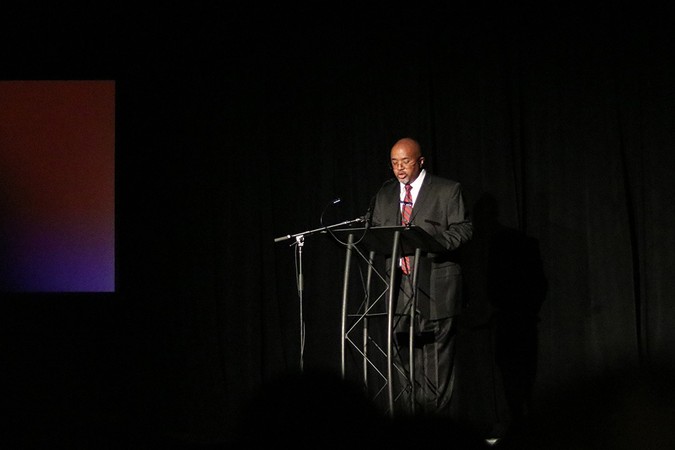Following Martin Luther King Jr. Day, Biola held a special MLK chapel, allowing for a time of reflection and celebration of King’s life and legacy.
THE HEART OF LOVE
Due to a shortened winter break, the university opened its doors to all students just in time for MLK Day. An entire chapel dedicated to commemorating the path that King paved for racial reconciliation, followed by a celebratory luncheon, proved to uplift hearts and ignite passion for unity in Christ.
A sentimental video of King’s life, followed by opening remarks from President Barry Corey and music based on one of King’s favorite hymns, set the mood for Second Baptist Church Rev. William Epps to delve into his brief sermon. His profound remarks regarding the purpose and place of love on the topic of equality called the audience to remember what love really looks like and how to put it into practice. Associate professor of anthropology David Shane Lowry acknowledged this, affirming that love needs constant practice.
“I like our speaker’s approach to what love is, in the context of light,” Lowry said. “I believe that whereas love is theological, as a principle taught throughout the Bible, it remains something that we have to remind ourselves how to do in everyday life.”
Epps offered an insightful and meaningful message that reinstated his thematic statement, “poking holes in the darkness,” throughout the sermon. His message dealt with Christians’ role on the topic of love, where he invites Christians to act out in faith.
“The speaker was right. Poking light in darkness,” said Leon Harris, Talbot School of Theology assistant professor. “We are the salt, and we as Christians, if we’re not the ones bringing up these conversations and showing them how it’s done in love, and reaching out to those who are marginalized, oppressed. If we’re not the ones doing it, no one’s gonna do it.”
With a call as great as that of loving all people, no room exists for inequality of any kind. Harris believes God created each individual with true individuality and complete worth. This means that every person deserves a place in community and fellowship with one another regardless of each other’s differences.
“It’s just a reminder that all of us are equally of worth in God’s eyes. It allows that otherness to always permeate to the top—I like that it allows that otherness to be valued, without being absorbed or changed,” Harris said.
After listening to Epps’s message, Harris reflected on its applicableness for him and other Christians alike.
“For me, it definitely constantly reminds me that God uniquely created us all in our uniqueness to remain unique without imposing our will on others to change or conform,” Harris said. “It means that conformity is not necessarily biblical—unity is biblical. But in order for us to be united, there has to be diversity, otherwise we aren’t united, we’re conformed.”
As a result of this unity in Christ, Christians play a vital part in the conversation of racial inequality. Lowry connects this to Paul’s teachings in Philippians, where Paul teaches what love really looks like. Lowry notes that racial reconciliation begins with a key understanding of the problem at its core, which in turn leads to change and newfound hope.
“I believe that we are now in these conversations, seeing what Paul was asking us to do was love. But don’t just love esoterically, love with this deep knowledge, this critical insight. With this willingness to kind of step beyond your boundaries permanently,” Lowry said.
A MEMORABLE MESSAGE
While Epps comes from outside the Biola community, Harris notes that he belongs to the same community—the Christian community. Every Christian participates in the call to love one another wholeheartedly.
“What I really enjoyed about this chapel is the gentleman that spoke is not the typical chapel speaker, but it reminds us that he is part of ‘us.’ He’s part of Christianity, he’s part of who we are,” Harris said. “He’s not an outsider coming in. And the receptiveness of the students was awesome.”
Epps left a lasting imprint on those who heard the heart of his message, including freshman nursing major Breanna Franz. Franz left encouraged to spread the light of Christ’s love in a world full of darkness and was assured the chapel’s lesson would remind her of this call to action.
“‘Poking the holes in the darkness’ is something that really [stuck] out to me,” Franz said. “And so now, when I think about this day, I’ll remember that phrase, and it will really just align me with these truths that allow me to poke holes in the darkness like he did.”







